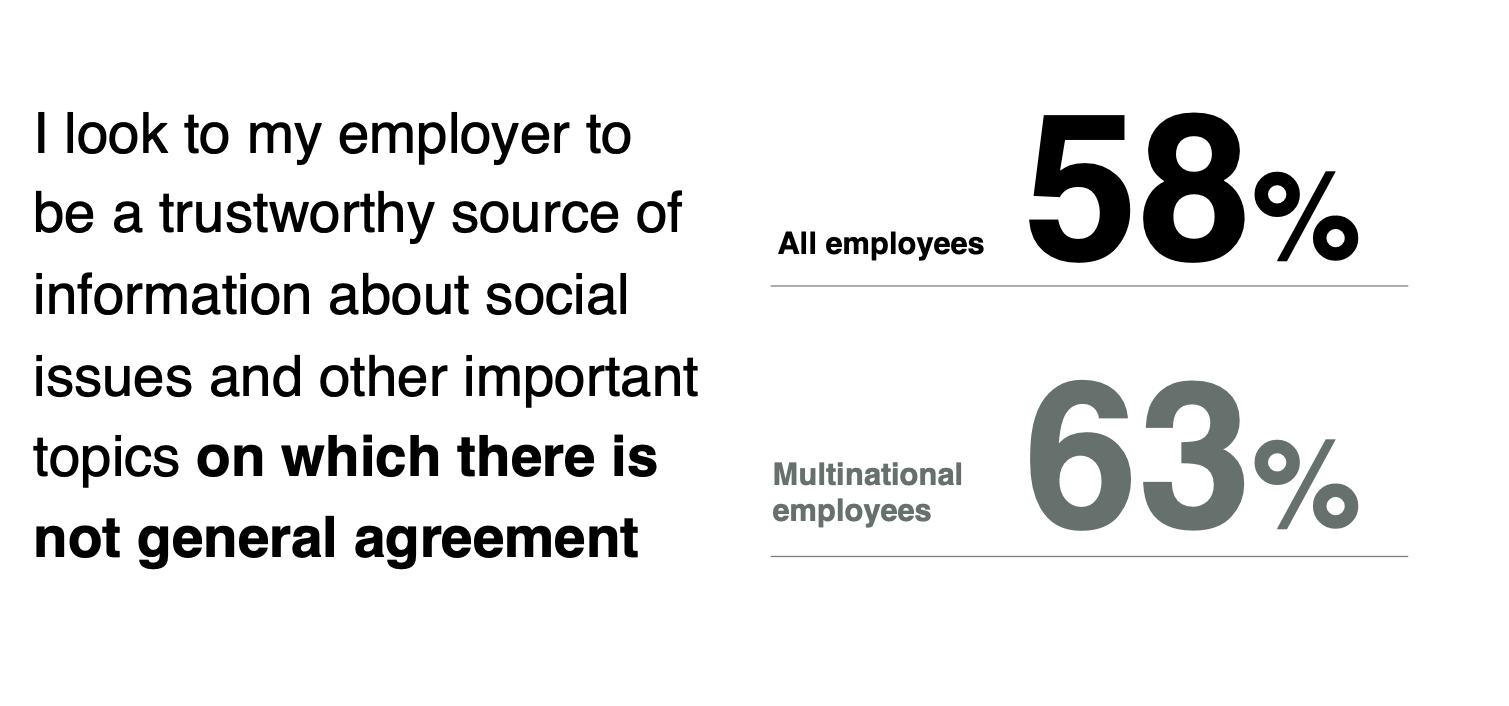This week Tom Fox and I dedicated our usual Compliance Into the Weeds podcast to the ethics and compliance implications of the mass shootings that happened in El Paso and Dayton last weekend. Nobody relishes analyzing something so painful for so many — but corporations are foolish to ignore what’s happening in this country, and increasingly they can’t escape it, either. So let’s take a look.
First, I keep coming back to a conclusion from the Edelman Trust Report released at the start of this year. That report found that public trust in government and other institutions has plummeted in recent years, both in the United States and around the world generally. Trust in government is at 47 percent, which means a majority of people distrust government. Trust in business is at 56 percent — a majority, but not much of one.
The exception to this trend is people’s employer. Worldwide, 75 percent of people worldwide trust their employer. In the United States, that figure is 80 percent. No other institutions come anywhere near those levels.
That might sound like good news, until you consider a few other statistics. First, only 20 percent of people believe “the system” is working for them. Another 72 percent say they feel “a sense of injustice” and 70 percent have a strong “desire for change.”
Consider all those sentiments together, and a picture starts to emerge: people deeply frustrated with large, distant institutions like government, the media, or Corporate America overall — because, we believe, those institutions are unable or unwilling to help people overcome the problems we encounter every day.
We don’t trust corporations to keep us economically secure. We don’t trust governments to keep us safe. And after what happened this weekend in El Paso and Dayton, or in so many other places so many times before, who can blame us?
People are looking for institutions larger than they are, that can help to bring about the changes that we want to see. And the one institution that most of us do trust is the one we know best: our employer.

Source: Edelman Trust Report
So we shouldn’t be surprised at all about two more findings from the Edelman Trust Report. First, that most people generally (76 percent) believe that corporate CEOs should take the lead in addressing difficult issues. And second, that most people (71 percent) believe their own CEOs, where they work, should do the same.
That, more than anything else, is why I say that the shootings last weekend point to an ethics and compliance issue. Because people are deeply frustrated with this country’s inability to solve its common problems, and they want corporations to fill that void, and that means companies need to start making choices.
Employees Forcing the Ethics
I know CEOs are reluctant to confront divisive political issues such as gun violence, immigration, gay rights, climate change, and the like. In an ideal world, they wouldn’t, because our political leaders would work to forge a consensus for all, rather than retreat to their usual rhetorical corners so they can raise more money from donors.
Well, that’s not our world. So CEOs have to start deciding how their companies will respond to these issues — and if they don’t, their employees and customers will do it for them.
For example, Walmart’s corporate employees staged a walkout Wednesday afternoon to protest the company’s gun sales. Walmart is one of the largest retailers of guns in the United States, selling them in roughly half its stores. Petitions are already circulating among consumers to pressure Walmart into ceasing gun sales, too.
One employee organizer had a comment in the Washington Post that said it best. He and his coworkers, he said, “no longer want to be complicit by working for a company that profits off the sale of firearms.”

A memorial in front of Walmart in El Paso.
Source: Reuters
The key words there are complicit and profit. The workers are saying that they no longer want their labor to contribute to something they find unethical. They are trying to force Walmart to confront the ethics of selling so many guns — since, well, no other institution in this country is confronting it. Certainly not the Trump Administration and Republicans in Washington.
Walmart and gun violence are only the latest example of this. In June workers at online retailer Wayfair walked off the job one afternoon, to protest their company selling beds to the Trump Administration for its migrant detention camps. The employees either wanted the company to sell the beds at cost (read: no profit) or to donate the profits from that sale to RAICES-Texas, the refugee advocacy group trying to help migrants held in camps by the Trump Administration. (For the record, Wayfair’s CEO promised to donate $100,000 to the Red Cross, which isn’t involved in the migrant crisis.)
We saw more of the same last year, when businesses like Deloitte, McKinsey, and Salesforce were all flayed by consumers and employees alike for doing business with the Trump Administration while it was separating migrant children from their parents. We’ve seen film production companies and movie stars threaten to stop working in Georgia if that state proceeds with an anti-abortion law enacted this spring, slated to go into effect in January.
Compliance Concerns Now
So back to the podcast Fox and I recorded this week. We addressed a few practical questions that companies will need to confront, and develop policies to address.
For example, if you’re a retailer in a state like Texas with lax gun laws, will you need to start providing more security in your physical stores? Will you want to consider banning guns on your property? Will you be able to enforce policies effectively, since gun laws vary by state?
More difficult, but more important, is how to address potential extremism within your employee ranks. For example, one compliance officer recently told me that an employee had asked to form some sort of “white persons support group.” Now, that idea is patently ridiculous and rooted in racism. The company did not support it.
My question: Is that sort of request a red flag? Because it can be a short, slippery slope from feeling like a disaffected white guy, to spending hours every night reading racist garbage in some Internet echo chamber, to buying an AR-15 and shooting every brown-skinned person you can find.
So what’s the appropriate amount of monitoring a company should do? What’s the discipline you impose on someone going down that path? What’s the statement you make when he (because it’s always a he) says you’re just persecuting him because he supports President Trump?
There, I said it. I named the elephant in the room. Trump.
This predicament that has entrapped us all, corporations and citizens alike, will get worse before it gets better because all these issues are deeply divisive politically — and President Trump is the singularly worst leader possible to guide us through these times. We will not solve them while he is in office.
If you disagree with that, quit reading now. We can’t have an intelligent discussion about these challenges facing corporations today without admitting that Trump needs this divisiveness and paralysis. He needs to spend all his time raging and fighting, because he’s too stupid, lazy, and venal to accomplish anything else, like building consensus or confronting the extremist voices sniveling in their Internet echo chambers.
The rest of us are left to struggle with these fraught, searing issues, and figure out what to do.
As I said on the podcast several times, I don’t know what to do. But I do know these issues won’t go away — and companies’ ability to avoid confronting them is just about gone.
This article was originally published August 7, 2019, on Radical Compliance and is reprinted here with permission from the author.



 Matt Kelly is founder of Radical Compliance, which provides consulting and commentary on corporate compliance, audit, governance, and risk management. Radical Compliance also serves as Kelly's personal blog. As the long-time (and now former) editor of Compliance Week, Kelly writes and speaks frequently on corporate compliance, audit, and governance, and now works with various private clients to understand the those fields and to develop go-to-market strategies or provide other assistance in reaching audiences of compliance professionals.
Matt Kelly is founder of Radical Compliance, which provides consulting and commentary on corporate compliance, audit, governance, and risk management. Radical Compliance also serves as Kelly's personal blog. As the long-time (and now former) editor of Compliance Week, Kelly writes and speaks frequently on corporate compliance, audit, and governance, and now works with various private clients to understand the those fields and to develop go-to-market strategies or provide other assistance in reaching audiences of compliance professionals. 






